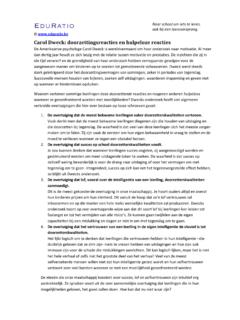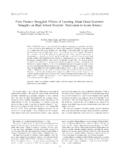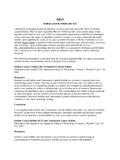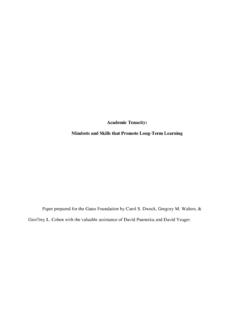Transcription of FIXED VERSUS GROWTH MINDSETS, BY CAROL …
1 FIXED VERSUS GROWTH MINDSETS, BY CAROL dweck There are two mindsets that students may have about their intelligence. With the FIXED mindset , students believe their intelligence is just a FIXED trait; they have a certain amount and that s it. As you will see when students are in this mindset they worry about how clever they are. They don t want to take on challenges or make mistakes; they want to stay in their comfort zone. But students who have a GROWTH mindset think no, it s not FIXED ; intelligence is something that you can develop. It s a potential that you can cultivate through educational instruction. Now, in a GROWTH mindset it s not that a student believes anyone can be Einstein, or that everyone is the same. But they understand that even Einstein wasn t Einstein until he spent years and years and years of dedicated passionate labor.
2 So in the GROWTH mindset talent is just a starting point; you jump off from there. I am often asked So which mindset is really true? and what is so exciting now is that more and more research from cognitive psychology and from neuroscience is producing evidence for the GROWTH mindset . Every few weeks it seems now, articles are being published showing that even the most fundamental aspects of intelligence can be trained and improved. And not just in young children, but in older individuals as well. The brain has so much more plasticity [the ability to be easily changed] than we ever dared to imagine. Even as adults we are generating new neurons, and that was never known before. Does a student hold the same mindset in different areas? Not necessarily. A student may believe that their personality can be developed, but that their intelligence is FIXED .
3 Or their language abilities can be developed but their mathematical ability, well that s FIXED , or vice versa. But whatever mindset they have in a given area will shape their motivation to learn. Can mindsets be changed? Can they be taught? Yes, and that s what s so interesting. When you leave them alone they are pretty stable, but now that we understand what a mindset is, we can go in and change it. And when we do that we transform student s motivation to learn. How do mindsets work? They work by creating an entire psychological world for students, where everything has a different meaning, and I ll be going through this in terms of the three rules of the mindsets. In telling you about the mindsets I am going to be focusing a bit on a study we did with hundreds of students who were making the transition to seventh grade, which is a very, very challenging transition in The States.
4 The work gets harder, the grading gets more stringent, the environment becomes less personal, and a lot of students turn off to learning. And we wondered would a GROWTH mindset help students get across that transition? So, at the beginning of seventh grade we measured students mindsets. We saw who believed their intelligence could be developed-- the GROWTH mindset , and who believed it was FIXED amount-- the FIXED mindset . We asked them a number of other things, and then we followed them over the next two years looking at their grades. mindset Rule Number 1 So, the first thing we found is in a FIXED mindset rule number 1 is look clever at all times and at all costs. And if you are not going to look clever, don t do it. But in a GROWTH mindset where you believe your abilities can be developed, the number 1 rule is learn, learn, learn. And in this study we found FIXED mindset students told us The main thing I want when I do my school work is to show how good I am at it.
5 The GROWTH mindset students didn t say things like that. They said It s much more important for me to learn things in my classes, than it is to get the best grades . They cared about grades, but they cared even more about learning. When we looked at them and we graphed their grades over the next two years we saw this; they had entered with exactly equivalent achievement, but by the end of their first term, their grades had jumped apart pretty dramatically, and their grades continued to diverge over the next two years. We found the same thing with college students who were in a pre-medical curriculum. Now, nobody cares more about grades than pre-med students; they have lived their lives for this moment; their parents have lived their lives for this moment, and yet the students with a GROWTH mindset said they cared even more about learning. And when we looked, at the end of their term, the students with the GROWTH mindset had actually earned higher grades, even controlling for past achievement.
6 They did this because they took charge of their learning; they studied more deeply; they managed their motivation; they managed their time. And if they got a poor grade on their initial exam, they made sure to pull it up. But when students with a FIXED mindset got a poor initial grade they thought I guess I am not good at this and they didn t change the way they studied, or the information they gathered, or the resources they used in their environment. More than any study we have ever done, the study I am about to tell you about shows dramatically how a GROWTH mindset turns you toward learning, but a FIXED mindset turns you away from learning. Learners and Non-Learners in Action - How do Mindsets Control our Attention? In this study we brought students one at a time into our brainwave lab. We outfitted them with a cap full of electrodes, that you see here, that measured the electrical activity from different parts of their brain.
7 We were especially interested in measuring the activity .. from a part of the brain that shows that they are harnessing their attention to learn something; to receive information. After they were fitted with the cap of electrodes they were seated in front of a computer, which asked them a long series of very difficult questions; here is Who was the union general at the battle of Gettysburg? The answer is Meade . What s the capital of Australia? which most Americans don t know Canberra . Anyway, the student typed in an answer. A second-and-a-half later they found out whether their answer was right or wrong. And a second-and-a-half later they found out what the correct answer really was. When we looked at students who had endorsed a FIXED mindset , they entered a strong state of attention to find out if they were right or wrong.
8 But that was it; their job was done. They didn t care about what the right answer really was. But when we looked at students with a GROWTH mindset , they entered a strong state of attention to find out if they are right or wrong, that s part of learning. But then they entered another very strong state of attention to find out what the correct answer really was. And they did this even when they had been correct. They wanted to elaborate upon their knowledge and learn more. Now, being psychologists, we didn t stop there. We gave them a surprise retest on the items they got wrong, and now we found that the students with the GROWTH mindset got significantly higher scores, because they cared about learning. And if you extrapolate that to real life you can think about it like this; people with a FIXED mindset are going around saying Am I right?
9 Am I clever? Tell me how bright I am? But people with a GROWTH mindset are saying Tell me when I am wrong, because I want to learn. I d like you now to take one or two minutes; turn to your neighbor and think about a time you were in a FIXED mindset and chose to be a non-learner. Maybe you had had some setbacks and you were not feeling you had the courage to learn. Maybe you had just been promoted into a new position and thought you had to have all the answers. Maybe you were in the presence of people who were judgmental and you were afraid to stretch. So think of a time you were in a FIXED mindset and chose to be a non-learner, and then think about, what could you do differently next time? mindset Rule Number 2 Let s move now to rule number 2. And this rule is crucial; it s about effort. In a FIXED mindset , effort is a bad thing.
10 Students in a FIXED mindset believe if you really have ability then things should just come naturally. They believe that .. they say To tell the truth, when I work hard at my school work it makes me feel like I am not very smart. So, what they are saying is, whenever they have to apply effort they feel stupid. They think if they were really clever it should just all come to them. But students in a GROWTH mindset believe that working hard is the key. They say The harder you work at something, the better you will be at it . They think that even geniuses have to work hard for their great discoveries. So, who s right? Do geniuses really work hard, or does it come naturally? Some of the most exciting work in all of psychology now is showing that there is one thing that distinguishes geniuses from their other talented peers, and that s how hard they have worked, how much practice they have put in to developing their skills.








